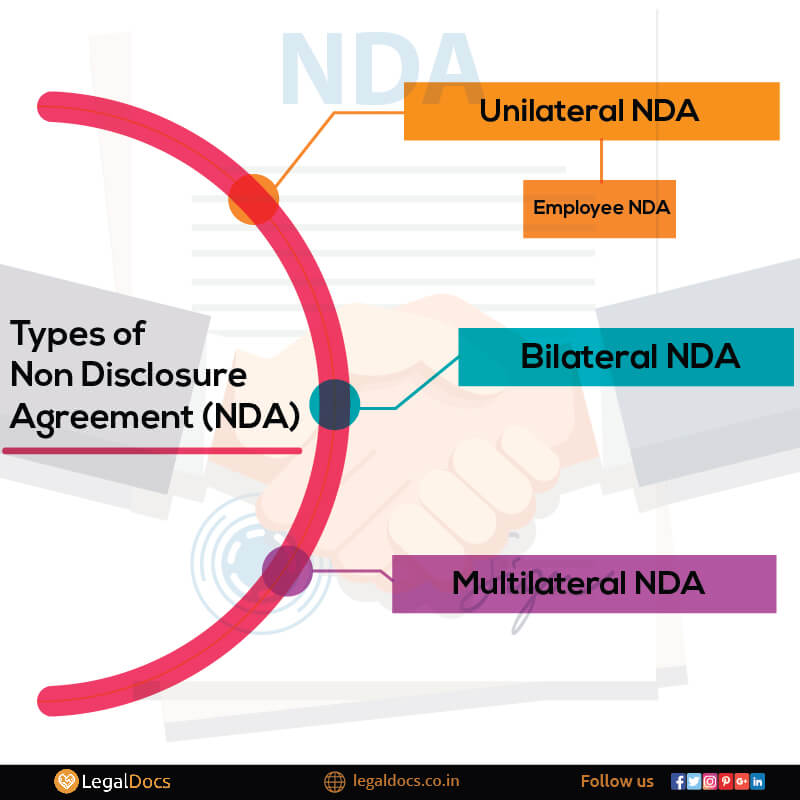What is a Non Disclosure Agreement (NDA)?
A Non Disclosure Agreement, also generally called as ‘Confidentiality Agreement’, is an agreement wherein the parties agree to share the confidential information/data which is specified in the ‘Confidentiality Clause’ of the Non Disclosure Agreement. The parties to the Non Disclosure Agreement also agree not to disclose such information to the third party beyond the terms of the agreement
Other Names of the Non Disclosure Agreement :A Non Disclosure Agreement has multiple names like:
- Confidential Agreement (CA)
- Confidential Disclosure Agreement (CDA)
- Secrecy Agreement (SA)
- Proprietary Information Agreement (PIA)
Types of Non Disclosure Agreement (NDA)?

How does entering into a Non Disclosure Agreement helps?
These days, be it a Startup or others, the major assets of any corporate body is its Intellectual Property. A Non Disclosure Agreement helps protecting the Intellectual Property Rights of the parties including its databases, client lists, proprietary information, sensitive business-related information, etc.
Following are some major benefits of entering into an NDA -
- A Confidential Clause in the Non Disclosure Agreement clearly defines what exactly is the ‘confidential matter’ for which the Non Disclosure Agreement is entered into.
- It helps in maintaining the utmost secrecy between the parties by binding them legally through various clauses constituted under the Non Disclosure agreement. This prohibits the receiving party from disclosing the confidential information.
- Various clauses of the Non Disclosure Agreement also draw the timeline upto which the party is obliged to maintain the secrecy. This period could be beyond the effective period of the NDA itself.
- A Non Disclosure Agreement is legally binding and thus the party infringing the agreement would be legally liable to compensate the damages to the aggrieved party (which is mostly the disclosing party).
- The dispute can be referred to the Arbitrator or even taken to the court if the level of violation demands. That’s how the owners of the confidential information is granted relief as they have taken effort to safeguard the shared confidential information through the Non Disclosure Agreement.
If not drafted properly, the Non Disclosure Agreement may lose its sole purpose. Thus, some precautions shall be taken by the parties, especially by the Disclosing Party, before finalising the Non Disclosure Agreement draft. Some of the major precautions to be taken are as follows:
- One shall ensure whether all the information which are confidential in nature and shared or will be shared with the other party is clearly and unambiguously mentioned in the Non Disclosure Agreement.
- Ensure that the parties to the agreement clearly understands what they are signing into. Their obligations and rights under the Non Disclosure Agreement shall be clearly known and understood by the parties.
- It is not advisable to to include unfair clauses in the NDA, but prior analysis of the nature of the other party shall be carefully done, which is also known as conducting Due Diligence, and accordingly necessary clauses shall be inserted in the Agreement.
- Behavior during the NDA can be an early indicator of what the entire negotiation process will be like. while it is not advisable to include unfair clauses in the NDA, it creates a challenging environment to be too rigid.
- None of the clauses shall be confusing or in conflict with the other clause in the same Non Disclosure Agreement, as it might create confusion amongst the parties. Since, the confusion between the parties may also lead to legal bills.
- In the case of dispute or breach of agreement, if the parties to the agreement mutually agree to refer to an Arbitrator instead of Court, it would be both time and money saving for both the parties.
When to sign a Non Disclosure Agreement?
There are various events or circumstances under which an NDA shall be entered into and signed. Few of them are as follows:
- into a business deal,
- While taking expert’s advice on a new product,
- while starting a new project,
- while investigating a possibility of investment with other party,
- while providing employment,
- while signing a contract worker for a sensitive project,
- while dealing with sensitive client information,
- while discussing commercially sensitive information with other party, etc.
so as to keep it secured as per the terms of the Non Disclosure Agreement which are inserted to protect the proprietary information from being misused.
Are Non Disclosure Agreements legally binding?
A Non Disclosure Agreement is governed by the Indian Contract Act, 1872 and according to it a Non Disclosure Agreement (NDA) is a legally binding contract. To ensure the further validity and enforceability of the Non Disclosure Agreement, it is suggested to stamp the NDA.
Is it mandatory to print a Non Disclosure Agreement on a stamp paper?
It is not mandatory to get an NDA printed on a Stamp Paper. An NDA can be printed on a letterhead of the company and signed by the parties on both sides of each page of the NDA
If you choose to print the NDA on a stamp paper, get it printed on a non-judicial stamp paper or e-stamp paper (available in certain states). Have the NDA signed in the presence of witnesses. After this you are required to get the NDA Notarized.
How to know the value of a Stamp Paper?
Each state in India has different value of stamp paper. Thus, depending upon the state in which the agreement is executed (here, Non Disclosure Agreement), the value of Stamp Paper shall be derived. The value of Stamp Paper or Stamp Duty payable can be found on the state government websites.
Does a Non Disclosure Agreement need to be notarised?
It is not mandatory to Notarise or to have the Non Disclosure Agreement signed by Witness. But to ensure the further validity and enforceability of the Non Disclosure Agreement parties may choose to have witnesses sign the NDA and entact the validity of the document so that it cannot be questioned in the court of Law.
What is the difference between Non Disclosure Agreement with Witness and Without Witness?
An agreement having witnesses has a limitation period of 12 years for bringing a claim for breach of agreement in the court of law whereas, the limitation period in case of agreement without witness is 6 years.
Limitation period means the legally specified period beyond which any legal action may not be entertained in the court of law.
Is Registration of a Non Disclosure Agreement necessary?
As per the Indian Contract Act which governs the Non Disclosure Agreement in India, registration of an NDA is not Mandatory. But it is advised to register an NDA as it becomes easy to prove the validity of the document as well as to prove your case.
What happens if you break the NDA?
The penalties over the breach of the agreement are generally specified in the agreement itself and the breaches or infringement are accordingly dealt with. If in any agreement the penalty is not specified, it is clearly mentioned that the person guilty of violation or breach of contract shall be sued for such misappropriation.
How long do Non Disclosure Agreement last?
There is no such specific time limit given on the duration of the Non Disclosure Agreement. Generally, the the Non Disclosure Agreement is seen to extend over a period of 2 to 5 years. The corporates may also enter into a Non-Terminating Non Disclosure Agreement so as to protect the trade secrets permanently.
But, as soon as the ‘confidential information’ covered under the NDA becomes public, the Non Disclosure Agreement has no effect and it comes to an end.
Importance of mentioning Jurisdiction Clause in NDA:Jurisdiction clause determines the courts of which city shall have jurisdiction over the Non Disclosure Agreement in case of dispute between the parties. Thus, it is very important to mutually agree and specify in the NDA that courts of which city will have jurisdiction over the dispute and the infringed agreement.
It is more vital to specify the Jurisdiction where the person from the foreign country is a party to the contract, else it could be a hugely expensive court fight!
Essential Content of the NDA:- Definition of Confidential Information
What is ‘Confidential Information’ in the transaction between the parties shall be clearly covered under the non disclosure agreement. Generally, the disclosing party might have broader definition, since the this party usually receives greater benefits under this agreement. Whereas, the receiving party may have a narrower definition for the same. - What is Not a Confidential Information
Inserting a clause mentioning what is NOT a confidential information is equally important. There could be multiple transactions for which some information cannot be expected to remain confidential. Also, the information which is already available to public cannot be treated as a ‘Confidential Information’. - Term of Confidentiality
It is very vital for any Non Disclosure Agreement to define and set forth the time period of the life of the NDA. Depending upon the nature of the transaction covered by the agreement the life of the non disclosure agreement can be decided. It could be 1 year, 10 years or for indefinite time. - Disclosure
The Non Disclosure Agreement shall also define with whom the party is allowed to share the confidential information. Especially while conducting due diligence or while analysing the nature of the party, the other party may need to share some confidential data (like, financial data) with its associated representatives, partners or companies. Thus, the ‘disclosure’ element shall also be clearly specified. - Exceptions to Confidentiality
There might be some unavoidable situations in which the party is under obligation to disclose the confidential information to the third party. Such situation may occur if the administrative authority, government bodies may ask for such confidential information or for legal proceeding the party might be asked to disclose such confidential information. In such situation, the party sharing such confidential information shall not be considered as infringing the terms of Non Disclosure Agreement. Thus, necessary exceptions to the Non Disclosure Agreement shall also be specified therein. - How to Return the Confidential Information
Generally, the way of handling the confidential information depends on the nature of the shared information. There shall be a clause which specifies in which way and within what time the recipient is expected to either return the document or is required to destruct the whole information received by the recipient as the confidential information. This is important as the information disclosed under the NDA shall not remain available to the recipient after the expiry of the life of the Non Disclosure Agreement. - Remedies
The disclosing party is at a bigger risk while sharing the confidential information. Thus, if there occurs any infringement of the clauses of the agreement or breach of agreement, the remedies available to the aggrieved party shall be clearly mentioned in the agreement. - Interaction with Employees
After setting up the deal, the other party often comes in touch with the employees of the disclosing party which could give an edge to such party to entice the employees of the disclosing party. They may induce such employees to leave their current employment in order to work for them. To safeguard the organisation from losing such potential employees, the non disclosure agreement shall have an employee solicitation clause restricting the other party from inducing or enticing the employees.
Current Account Opening
A current account is a type of deposit account that helps the professionals and businessmen to run their business. Businessmen can avail various benefits by Online Current Account such as:
- Unlimited transactions
- Customized features
- Online banking services
Online current account reduces the hassle and provides the benefit to complete the banking process anytime and anywhere.
Are you Ready to Grow your Business?
- Zero Balance Current Account
- In just 5 mins
- Free Current Account Powered by ICICI Bank
 Knowledge Center
Knowledge Center























